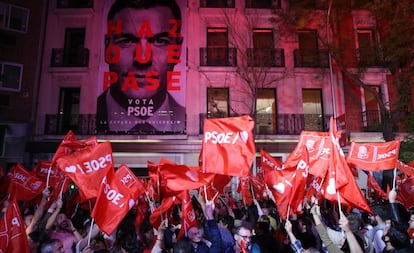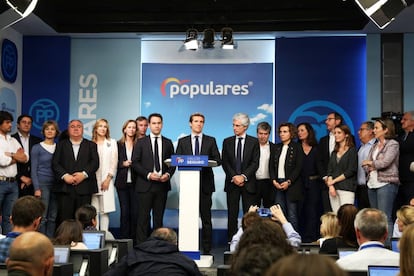Analysis: How did Sunday’s elections change Spain’s political landscape?
As support for the Popular Party crumbles, the PSOE took the highest number of seats but will need to reach a deal with Podemos and other smaller groups if it is to govern

Just two years after being ousted from the helm of the Socialist Party (PSOE) and returning to the post after winning party primaries, Pedro Sánchez has won Spain’s general election more decisively than expected.
Sánchez has even come close to winning a large enough majority to be reinstated without help from Catalan separatist parties. Instead, he fell one seat short of the absolute majority (176 seats) that would result from an alliance of the PSOE with Unidas Podemos (an alliance of United Left and Podemos), the Basque Nationalist Party (PNV) and another small group.
But with 123 seats in Congress, up from 84, the acting prime minister is now in a very comfortable position thanks to a weakened opposition: the Popular Party (PP) has suffered a crushing defeat, managing only 66 deputies compared with 137 at the 2016 elections. And the Socialists will enjoy an absolute majority in the Senate, which had been dominated by the PP until now.

The ultra-nationalist Vox is also in a celebratory mood: it has become a new congressional presence with 24 deputies, representing 10.26% of the vote. Despite this victory, Vox will not play a decisive role in the formation of a new government, as it has fallen well short of the figures predicted by some pollsters. Spain now joins the list of European countries with a far-right party in parliament, although unlike in Italy, it will not wield power.
Ciudadanos (Citizens) was one of the other big winners of the night, but theirs could be a useless success if the PSOE teams up with other parties in a leftist coalition. The center-right group expanded its presence from 32 representatives in 2016 to 57, making it the third-largest force in Congress, but its leader Albert Rivera ruled out a coalition with the PSOE during the campaign.

Unidas Podemos retreated from 71 seats to 42, putting it in fourth place. Despite the loss of 30 deputies, the anti-austerity group has managed to do less badly than the polls were predicting, and its leader, Pablo Iglesias, will seek a governing coalition with the Socialists. For the first time since the return of democracy, Spain could have ministers ideologically to the left of the PSOE. The leftist bloc represented by the PSOE and Unidas Podemos ended up with 20 more seats than the combination of PP, Ciudadanos and Vox.
Regional representation
Meanwhile, the separatist Catalan Republican Left (ERC) has increased its presence in the national parliament from nine deputies in 2016 to 15, a significant rise. Another Catalan separatist group, Junts per Catalunya – the party of former regional premier Carles Puigdemont – earned seven seats.

Two other regional parties improved on their 2016 results: the Basque Nationalist Party (PNV) earned one extra seat and now has seven deputies in Congress, while the radical leftist Basque party EH Bildu doubled its presence from two seats to four.
The Canaries Coalition has two deputies, Navarra Suma earned two seats, the Valencia-based Compromís secured one, and the Regionalist Party of Cantabria (PRC) became the other new member of Congress after Vox with one representative. The Coalition for Melilla, from the Spanish exclave city on the northern coast of Africa, came very close to earning a seat as the vote count progressed.
Dealmaking
In this scenario, the PSOE is the only party able to build a governing majority. Ciudadanos has come close to overtaking the PP, and the sum of its deputies with the Socialist representatives would be enough for an absolute majority. But Ciudadanos leader Albert Rivera has ruled out that possibility, and PSOE supporters standing outside party headquarters on Sunday night chanted: “Not with Rivera!”

It was a disastrous night for the right. The new leader of the PP, Pablo Casado, has led the party to the worst result in its entire history, well below even the most pessimistic forecasts. Nine months after taking over from Mariano Rajoy as party president, it is evident that Casado’s shift to the right has proven to be a terrible mistake: it has lost center voters to Ciudadanos, and ultra-conservative voters to Vox.
Casado – who, rarely for him, did not take any questions – said that it was “a very bad outcome” but blamed “fragmentation of the vote” and appeared willing to remain at the helm of the party. The PP will now try to contain the losses at upcoming local and regional elections on May 26.
The situation signals a complete change from just one year ago, when the PP’s Mariano Rajoy was in power and the PSOE was doing dismally in the polls. Things began to change with the no-confidence vote led by Sánchez in June 2018, which triggered a power struggle in the right and brought the PSOE and Podemos in sync with each other.
English version by Susana Urra.
Tu suscripción se está usando en otro dispositivo
¿Quieres añadir otro usuario a tu suscripción?
Si continúas leyendo en este dispositivo, no se podrá leer en el otro.
FlechaTu suscripción se está usando en otro dispositivo y solo puedes acceder a EL PAÍS desde un dispositivo a la vez.
Si quieres compartir tu cuenta, cambia tu suscripción a la modalidad Premium, así podrás añadir otro usuario. Cada uno accederá con su propia cuenta de email, lo que os permitirá personalizar vuestra experiencia en EL PAÍS.
¿Tienes una suscripción de empresa? Accede aquí para contratar más cuentas.
En el caso de no saber quién está usando tu cuenta, te recomendamos cambiar tu contraseña aquí.
Si decides continuar compartiendo tu cuenta, este mensaje se mostrará en tu dispositivo y en el de la otra persona que está usando tu cuenta de forma indefinida, afectando a tu experiencia de lectura. Puedes consultar aquí los términos y condiciones de la suscripción digital.









































